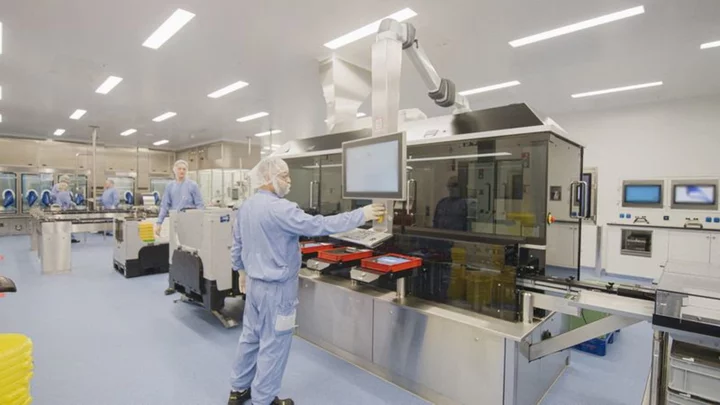GSK Plc raised its guidance for the year after a strong start to 2023 as it prepares to begin selling one of the first vaccines to prevent a common respiratory virus.
Sales will increase by as much as 10% and earnings per share by as much as 17% this year, the UK drugmaker said in a statement Wednesday. The shares were little changed in early London trading amid concern about whether new medicines can fuel growth enough to offset patent expirations.
Chief Executive Officer Emma Walmsley is attempting to prove GSK can go it alone as a pharma business after splitting from the consumer-products unit that made Centrum vitamins last year. The drugmaker has been under pressure to replenish its pipeline as it stands to lose exclusivity on products including one of its key HIV drugs.
Earnings per share last quarter rose to 38.8 pence (50 cents) excluding some costs, helped by the success of a blockbuster vaccine for shingles. That beat analysts’ estimates of 35 pence.
New medicines set to start generating revenues include Arexvy, the respiratory syncytial virus vaccine for older adults cleared for sale in the US, the UK and the European Union in recent months.
Litigation related to the drugmaker’s blockbuster heartburn medication Zantac over allegations it caused cancer continue to hang over the company, despite GSK settling the first bellwether case in California last month.
‘Avoid Distraction’
The company said Wednesday the settlement reflects its “desire to avoid distraction.” The next case has been set for trial in November, with more cases scheduled for 2024 and 2025.
GSK’s provisions for all litigation increased to £300 million this year from £200 million at the end of 2022, the company said in its quarterly statement.
Zantac concerns have weighed on the stock price. GSK shares are down 3.1% so far this year, behind peers including Sanofi and Novartis AG.
The drugmaker’s prior forecast was for sales to rise as much as 8% this year and earnings excluding some costs as much as 15%. The guidance doesn’t include revenues from Covid-19 products.
(Updates with shares in second paragraph)









